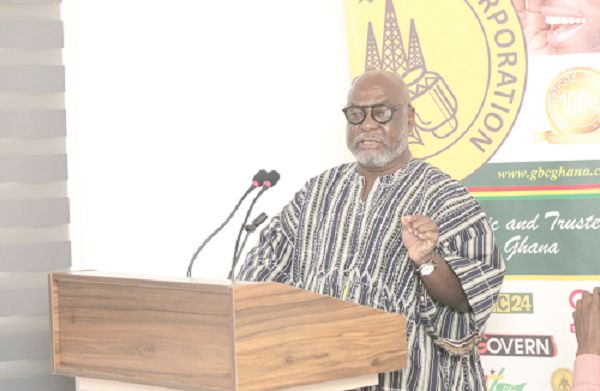
Find effective means of collecting TV licence fees — Prof. Karikari
The Dean of the Faculty of Communication Studies of the Wisconsin International University College, Professor Kwame Karikari, has urged the government to either repeal the television licence law or find more acceptable means to collect the fees.
Against the backdrop of the financial challenges facing the state broadcaster, the Ghana Broadcasting Corporation (GBC), he said, there was the urgent need to resolve the issue of funding the corporation.
Advertisement
According to Prof. Karikari, who is a former Director-General of the GBC, the state broadcaster now owed electricity bills totalling GH¢23 million, with its headquarters alone consuming GH¢195,000 worth of power monthly.
Lecture
Delivering a lecture on the theme: “The state of the state broadcaster” as part of activities marking the 84th anniversary of GBC, he peeled layers off the challenges facing the country’s oldest media institution, saying that although the government expected GBC to contribute towards the funding of its programmes, according to its statutory mandate, both the government and the regulator, the National Media Commission (NMC), were not supporting the GBC enough to raise the needed funds.
Mandate
The National Liberation Council Decree (NLCD) 226, which governs GBC, lists its funding sources to include government grants, bank loans obtained under government guarantee and the collection of TV licence fees.
However, with the government cutting off grants for equipment and capital goods, the financial challenges of the corporation worsened when the state pressed the panic button by suspending the TV licence fees in 2018 in response to a public uproar over the legal processes intended to prosecute defaulters.
That aside, GBC’s share of advertisers’ budget had also dwindled following the proliferation of radio and television stations in the country.
Challenges
According to Prof. Karikari, who is also the Board Chairman of the Graphic Communications Group Limited (GCGL) and media expert, while GBC projected a GH¢7 million quarterly revenue, it was able to raise only GH¢2.5 million.
The poor finances, he said, took a toll on programming, with the corporation delivering content that fell short of its benchmark.
“GBC’s programming nowadays appears to be a mixture of timid attempts to maintain serious public service standards and an energetic effort to copy the banal programming of the philistine sections of the private sector,” he added.
He said GBC had lost much of its audience, principally because it did little or nothing to meet the constitutional obligation set out in Article 162(5), which enjoined a free Ghanaian media to hold the government to account.
“GBC almost never does those stories or documentaries that question misdeeds by state institutions, agencies and officials; The kind of watchdog stories that usually attract huge audience attention and interest.
“Nor is it able to introduce appealing entertainment or cultural programmes of local origin and interest because it lacks the resources to hire outstanding local creative artistes or purchase high quality local independent production,” he added.
Prof. Karikari further observed that self-censorship and partisan polarisation were affecting productivity, professional standards and creativity of the corporation.
He, however, commended GBC for fulfilling its civic duties over the years, which he said kept the citizenry informed.
Attacks
On attacks on media practitioners, he entreated President Nana Addo Dankwa Akufo-Addo to speak out on the growing feeling of insecurity in the media landscape in the country.
“It is important that the President pronounces himself on the question to reaffirm his commitment and to send a strong signal of disapproval to the sources of these threats,” he said.
Transformation
The Minister of Information, Mr Kojo Oppong Nkrumah, indicated that the government was committed to transforming GBC to fulfill its mandate and revealed that a committee had been set up to study the current media landscape and proffer solutions on how best to situate public service broadcasting.
“We are working with you and the National Media Commission (NMC) to refocus GBC and public service broadcasting in general,” he added.
Interference
For his part, the Chairman of the NMC, Mr Yaw Boadu-Ayeboafoh, said while it was the commission’s job to insulate the state-owned media from governmental control, it could not interfere in the management of such media houses, including GBC.
He said it was the responsibility of the management and staff of the corporation to protect its image, in spite of the financial challenges, and not mire it with partisanship or allow themselves to be used to execute political interests.
In a speech read on his behalf, the Board Chairman of GBC, Rev. Prof. Emmanuel Adow Obeng, said broadcasting was capital intensive and. therefore. needed to be funded.
He, therefore, urged the public to endeavour to pay their television licence fees to support GBC.



